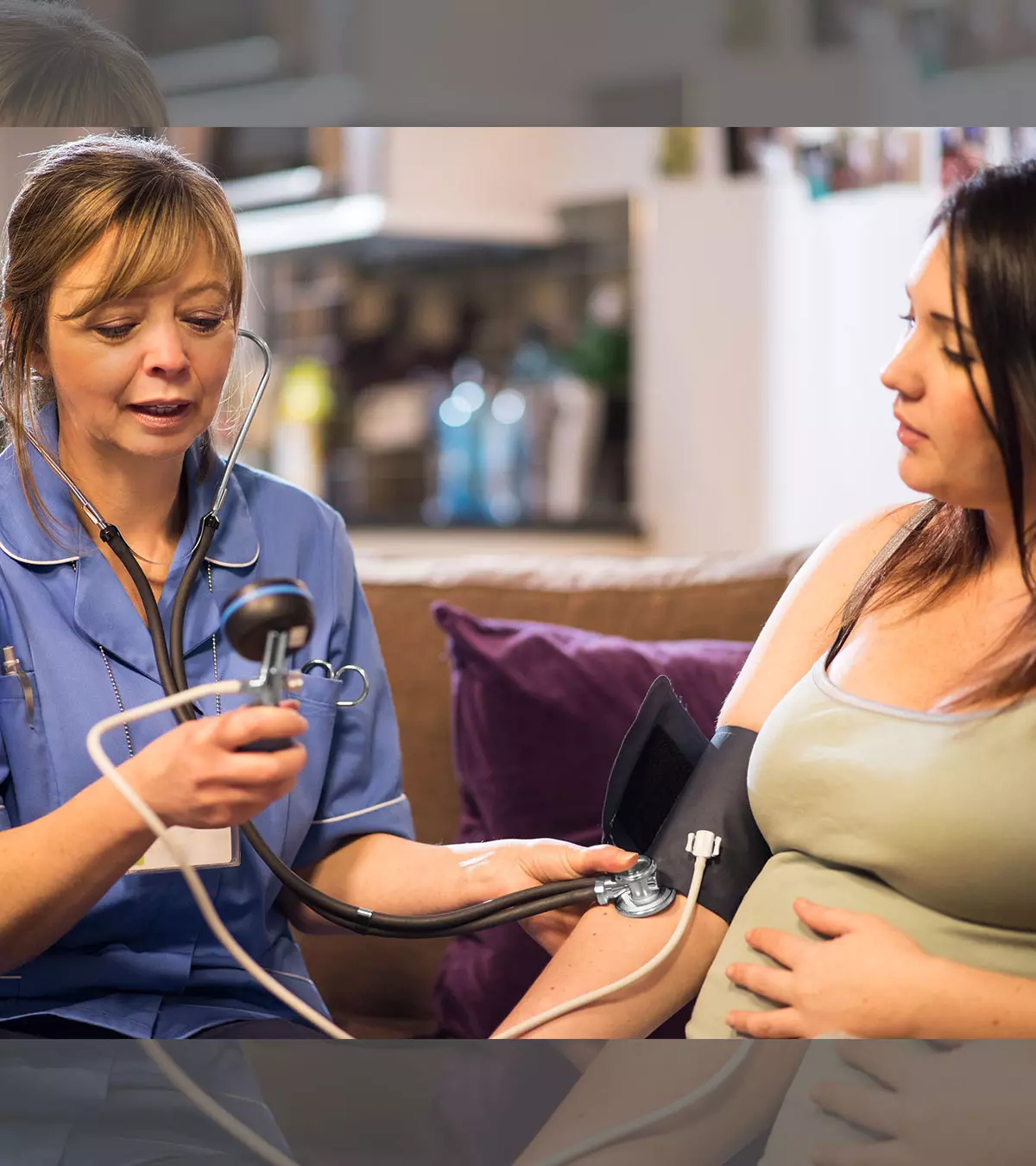

Image: iStock
It is not uncommon for women to experience low blood pressure in pregnancy. Blood pressure fluctuations may occur during any trimester of pregnancy. It usually returns to normal levels after delivery. These changes do not cause any serious issues for most pregnant women but might be bothersome for some.
This post shares the causes, symptoms, effects, and treatment of low blood pressure in pregnancy.
What is low blood pressure?
When the force of blood flow in the arterial walls reduces, it is called low blood pressure. Low blood pressure has the systolic to diastolic reading of 90/60mmHg (1). If the top value is less than 90 irrespective of the bottom value, or the bottom value is less than 60 regardless of the top value, it is considered as low blood pressure.
Low blood pressure is perceived to be better than high blood pressure as it reduces the risk of heart diseases and strokes.
However, dangerously low blood pressure can be a cause of concern.
Blood pressure usually remains lower during the first 24 weeks of pregnancy, after which it gradually rises to normalcy (2). There are a few factors that contribute more to low blood pressure during pregnancy. Keep reading to know more.
What causes low blood pressure during pregnancy?
Generally, low blood pressure is due to blood loss, dehydration, heart problems, pregnancy, endocrine problems, nutritional issues, infection allergies, and certain medications (3). In pregnancy there is a reduction of systemic vascular resistance (21%) as well as pulmonary vascular resistance (34%). So, overall there is a 4% drop of blood pressure.
Specific causes of low blood pressure during pregnancy include:
- Dilation of the blood vessels due to hormonal changes
- Being in a supine position for long (4)
- Orthostatic hypotension, a condition that leads to a sudden drop in the blood pressure when you stand up suddenly (5)
- Blood loss in case of an ectopic pregnancy (6)
- Dehydration, which reduces the blood volume and leads to a drop in the blood pressure level (7)
- Hypoglycemia, also known as low blood sugar, which is more likely in women with diabetes (8)
The following section tells about the symptoms of low blood pressure that you must watch out for.
What are the signs and symptoms of low blood pressure during pregnancy?
The symptoms and signs of low blood pressure during pregnancy include (9):
- Fainting
- Dizziness
- Weakness
- Sweating
- Backache
- Nausea
- Muscular twitching
- Pallor
- Dyspnea
- Blurred vision (10)
- Disorientation
Consult your doctor if you experience any of these symptoms during pregnancy and are restless because of them. A doctor can evaluate the severity of the condition and recommend the appropriate treatment for it. He may suggest changes in your diet and your activity levels to help deal with the condition.
Though low blood pressure is a normal condition during pregnancy, its risks cannot be overlooked.
Is low blood pressure dangerous during pregnancy?
Dizziness or fainting
can make a pregnant woman fall, which is highly risky and can lead to (11):
- Preterm labor
- Placental abruption
- Fetal distress and fetal death
Therefore, it is necessary that you be careful while walking or doing any household chores. If you feel like you might faint, immediately sit or lie down and stay that way for some time.
Can low blood pressure affect the unborn baby?
Yes, in some cases. A study on the effect of low blood pressure during pregnancy suggests that low blood pressure does not correlate with poor perinatal outcomes. However, there could be a direct relation between low blood pressure and the birth weight in the case of women whose blood pressure falls on standing suddenly (12).
Next, we talk about the different types of treatments for low blood pressure during pregnancy.
How to treat low blood pressure in pregnancy?
Medication for treating low blood pressure during pregnancy includes the administration of mineralocorticoid 11-Desoxycorticosteronönanthat (Cortiron (R)-Depot). It is recommended when the maternal hypotension is 110/60mmHg and below. It poses no side-effects to the fetus, and may even show an improved fetal outcome (13).
You can also try a few home remedies to manage the condition (7).
- Avoid standing up suddenly from a sitting position.
- Do not stand for a long time.
- Wear compression stockings that put pressure on your feet and facilitate the blood flow.
- Have plenty of fluids to keep yourself hydrated.
- Wear comfortable and loose clothes to keep the body cool.
- Avoid the consumption of alcohol.
- Eat smaller meals, several times a day to keep the blood sugar level in check.
- Increase the intake of salt in your diet (14)
Include foods such as beetroot, nuts, and whole grains (15) in your diet, even though they are known to lower the blood pressure. These foods are rich in other nutrients that are essential during pregnancy.
Frequently Asked Questions
1. What is the normal BP for a pregnant woman?
According to the ACOG guidelines, 120/80mm Hg blood pressure is considered normal in pregnant women (16).
2. Does low blood pressure mean boy or girl?
More research is needed to prove the association between maternal blood pressure and a baby’s gender. However, one study stated that the male gender was linked to a lower risk of preeclampsia (in preterm births), and its etiology was not well established (17).
During the first 24 weeks of pregnancy, most pregnant women have low blood pressure, which progressively returns to baseline afterward. However, some other factors, including dilatation of the blood vessels due to hormonal changes, orthostatic hypotension, supine position for an extended period, and hypoglycemia may also cause low blood pressure in pregnancy. Self-care is the ideal approach to dealing with it, so you should stay hydrated, wear comfortable clothes, eat healthy and smaller meals, and increase salt consumption. Talk to your doctor if the symptoms bother you and make you feel restless.
Key Pointers
- Low blood pressure during pregnancy is caused by blood vessel dilation due to hormonal changes.
- If you experience symptoms such as dizziness, lethargy, or blurred vision while pregnant, consult your doctor.
- Dizziness due to low blood pressure can make you fall, leading to premature labor or fetal distress.
- If the maternal blood pressure is less than 110/60mmHg, the doctor may administer mineralocorticoid 11-Desoxycorticosteronönanthat.
References
1. What is low blood pressure?; Blood Pressure Association (2008)
2. Low Blood Pressure; Nicklaus Children’s Hospital (2019)
3. P Rachael James and Catherine Nelson-Piercy; Management of hypertension before, during, and after pregnancy; NCBI (2004)
4. Liam Wright; Postural Hypotension In Late Pregnancy; British Medical Journal (1962)
5. Orthostatic Hypotension; National Organization for Rare Disorders (NORD) (2017)
6. Ectopic pregnancy; March of Dimes (2019)
7. Hypotension; NIH
8. Low Blood Pressure – When Blood Pressure Is Too Low; American Heart Association, Inc (2016)
9. Harry Oxorn; Postural Hypotension in Pregnancy; NCBI (1960)
10. Orthostatic Hypotension; Cleveland Clinic (2019)
11. Karisa K. Harland, et al.; Risk Factors for Maternal Injuries in a Population-Based Sample of Pregnant Women; NCBI (2014)
12. Low blood pressure in pregnancy; NCBI (2007)
13. Grünberger W, Parschalk O, Fischl F; Treatment of hypotension complicating pregnancy improves fetal outcome; NCBI (1981)
14. The effect of a low salt diet on blood pressure and some hormones and lipids in people with normal and elevated blood pressure; NIH
15. Five foods to help lower blood pressure; National Heart Foundation Of Australia (2016)
16. Preeclampsia and High Blood Pressure During Pregnancy; ACOG
17. Emma Elsmén et al., Fetal gender and gestational-age-related incidence of pre-eclampsia; Acta Obstetricia et Gynecologica Scandinavica (2006)
Community Experiences
Join the conversation and become a part of our nurturing community! Share your stories, experiences, and insights to connect with fellow parents.
Read full bio of Subhashis Samajder
Read full bio of shreeja pillai














